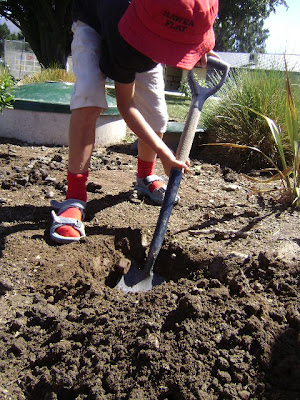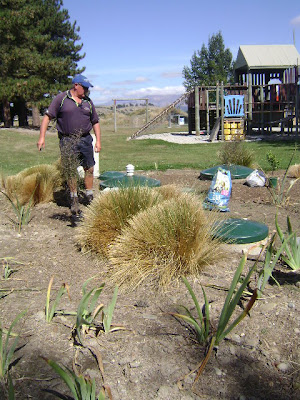






Constable Vink came to talk to us about who to talk to if you need help. We recorded our ideas in a spider web with Family in the middle of the web, then school and then community on the outside.
The family group were people like Mum or Dad, friends and family. The school group included teachers, the principal and Leanne in the office. The community group was people like Doug, the Police and Liz and Dave at the shop.
The spider web shows us who to talk to when we need help, like an emergency, or when you need help with a problem that you cannot solve yourself.
He told that if one person does not listen we need to keep on telling other people in our web.
Constable Phil also allowed us to ask him questions about what he does every day as a police man. It was nice to know that he only uses his gun in training and has never had to use it for real.




We went out with Doug to plant some trees by the septic tank. First we dug a hole, layered horse poo in it, then soil, then added the plant and covered it with more soil. We also spread more horse poo around the plants.
We planted Flax, Coprosma , Hebe and a Kowhai. We earned the plants from ‘Paper for Trees’, which is an organization that donates trees when you recycle your paper.









Mark and Jude came today to give us some coaching for the triathlon next week. We focused on the transition area (the place where we park our bike) and also went for a short ride and a run.
Triathlon Points to Remember…
1. You have to set up you bike to face the correct way.
2. Keep your helmet with your bike so it doesn’t get kicked by others.
3. Mark out your bike space with your towel, so you know where to put your bike back after the run.
4. You must wear proper shoes… no – Crocs, jandals or bare feet.
5. Sensible clothing.
6. Do not touch you bike until your helmet is on.
7. Walk you bike in the transition area.
8. Set up your helmet with the straps facing out so easier and faster to clip on.
9. Have your tyres pumped up!
10. Only get on you bike once Jude says “Mount your bikeJ”.
11. Make sure you are off your bike in the area where mark says “Dismount your bike J”.




We have been looking at the Art of Dick Frizzell.
We have grouped these pieces of art into different groups depending on where we see similarities.
We have used Dick Frizzell’s concept of words in artworks with our Pastel landscapes. We chose words that we thought really described Hawea, Otago and Hawea Flat School.









With the addition of the new tennis courts we have added a valuable community resource to Hawea Flat School and the Hawea Community. They are getting well used in the weekends and after school and today was the first of 4 lessons from Wanaka tennis coach Perry.
The forehand was the learning out come today and it goes like this…
Starting Position

Star Position

Big Nose
While reading the local Wanaka Sun last night I was surprised with the stories on the front and back pages as they both were about two members of Room 6.
So I have included a pic of the story, link to the online version of the paper and once I see the two sporty stars tomorrow morning I will get them to explain why they were in the paper.



Ditto
By Luca
I have a cat named Ditto, he is very thin and all ways sleeping in the day.
Every night Ditto is away hunting and in the morning there is a dead rabbit out the front door.
He is grey with black strips across him. He eats budget meat casserole and cat nuggets. When kids are over they wind him up so he gets all feisty and attacks us.
Ginger
By Emily
Ginger is Emily’s Guinea pig. He likes to run, to hide and he likes eating inside by the sofa with Emily.
Ginger lives in hutch outside, with his brother Henry the 8th and Poppet his friend the rabbit.
He has twitchy whiskers, beady eyes and a nose that is always twitching. Ginger is the colour ginger and has funky fur that sticks up in Mohawks all over his body.
Mouse
By Abby
Some people have a cat or a dog or a rabbit. Abby has a guinea pig, a guinea pig named Mouse, that lives in a large cage outside on the grass.
Mouse’s cage was a rectangle with wheels, there was an area to run around in and a ramp to go up and down, which he used to hide under. In the inside of the cage was scrunched up newspaper to snuggle up to in winter.
Mouse is a small brown guinea pig with red sensitive eyes that closed in the sun. He has small scaly feet with claws that gave him grip.
One time I put Mouse on the ground to get his carrot. He shot out of the towel and under the couch! It took ten minutes to get him out!


